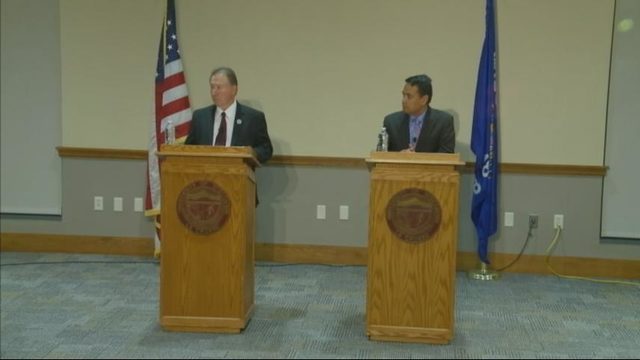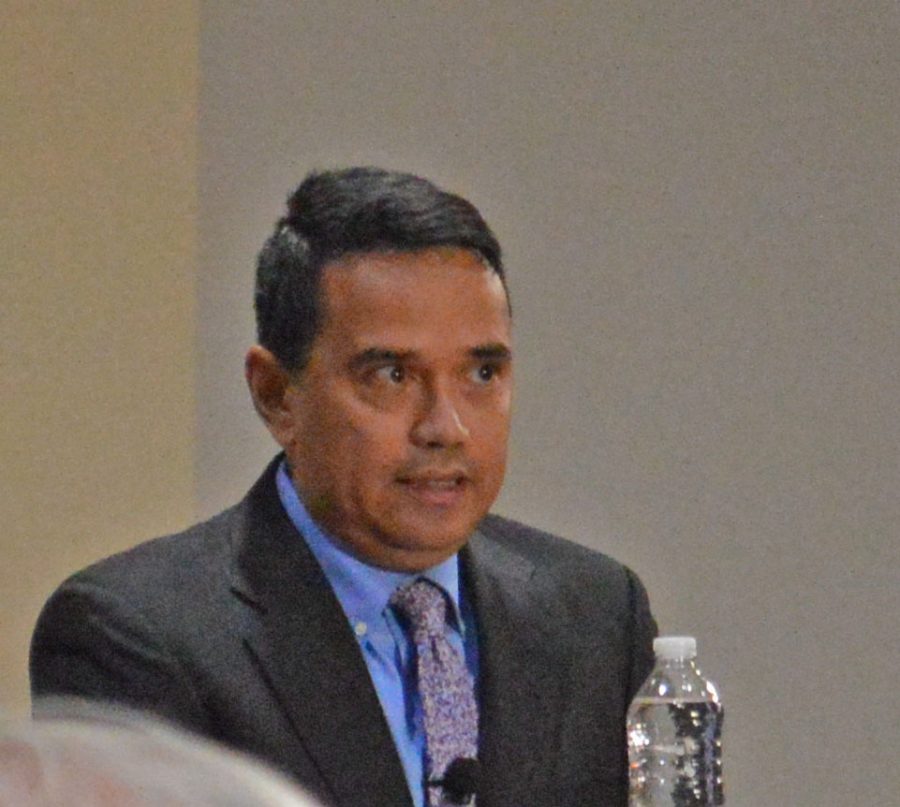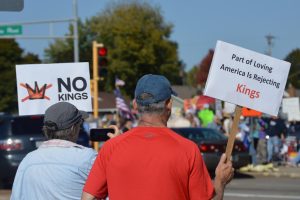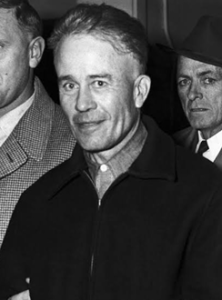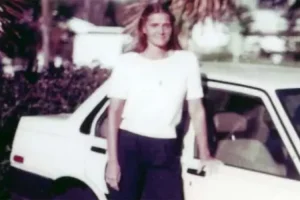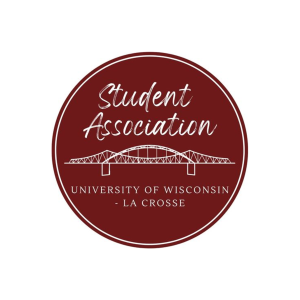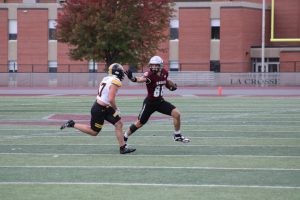Four assembly candidates visit UWL to debate
Steve Doyle and Albert Rohland faced off in the 94th Assembly District debate at UWL.
October 25, 2018
On Oct. 23, candidates running to represent Wisconsin’s 94th and 96th Assembly Districts came together to debate in the University of Wisconsin-La Crosse’s Cleary Alumni & Friends Center. Candidates competing for the positions are, from the 94th, Democrat Steve Doyle and Republican Albert Rohland, and, from the 96th, Democrat Paul Buhr and Republican Loren Oldenburg.
The event was hosted by the UWL Joint Legislative Relations Committee, with community sponsors including the La Crosse Tribune, WXOW News 19, WKBT, News 8, League of Women Voters, WLSU/WPR and WIZM/Midwest Family Radio. UWL’s Academic Staff Council, Faculty Senate, University Staff Council, Student Association and the Political Science/Public Administration Department also contributed to the event.
Midterm elections are set to take place Tuesday, Nov. 6. For information on voting, visit myvote.wi.gov.
The 94th Assembly District
Wisconsin’s 94th Assembly District contains all of La Crosse County, except for the City of La Crosse, which is instead included in the 95th.
Doyle, a native to La Crosse, stood strong for the need of bipartisan work within the state government. He gave an example of the need of bipartisanship when discussing foster care, having said, “Kids who are abused and neglected aren’t democrats. They’re not Republicans. They are children and the solutions to their plight aren’t Democrat solutions. They’re not Republican solutions. They are human solutions.”
He continued on to state, “There are so many areas where we can find ways to work together.”
Rohland agreed with Doyle, mentioning that he sees the job as a task to be done, not something defined by right or left political stances.
Doyle declared, if elected, his greatest efforts will be focused on education, saying, “Education isn’t an expenditure. It’s an investment. It’s an investment in our children. It’s an investment in our future.”
He showed concern about Wisconsin’s education system as he sees the quality of schools going down recently within the state. He wants to step away from the process of referendums within districts and hopes to make the state cover two-thirds of the cost of education once again.
Doyle added, “We have to make education affordable and quality.”
Rohland said that his greatest efforts will be focused on infrastructure if elected. “You can have the best schools in the world, but if you can’t get to school, it kind of defeats the purpose of having a great school. If you’re out in the middle of nowhere, how will you get there?” he stated, explaining his decision, while also noting that infrastructure is needed to support a healthy economy.
Rohland’s views on education funding include the need for families and students to focus on the tuition payments personally, by saving over time and making sacrifices, along with applying for scholarships.
On the legalization of marijuana, Doyle supports the idea of having it legalized, especially for medical use. He believes that doing so will allow the state to regulate it and make it safer for those who choose to use it.
Rohland mentioned that the addictive nature of the drug and the incorrect processing of it in states that have already legalized marijuana has caused more negatives than positives.
He noted, “I have no real opinion on marijuana as a whole. It’s just not my thing.” He does want to examine possible long-term effects though if it was legalized.
“It needs to change,” Doyle said on the topic of gerrymandering within the state. He hopes redistricting planning will eventually be placed in the hands of a non-partisan commission, which will then send its plan to the assembly to be voted upon. He stated that it would be needed for this change to be a constitutional amendment, so it cannot be reverted to the old practice when the majority party changes.
Rohland showed his support for the current system though, noting, “Everybody always feels disadvantaged if you’re in the minority party.”
Rohland explained his belief that is is in the hands of the voters to inform themselves about the issues and candidates, while Doyle expresses his hope for education opportunities for voters.
Other topics discussed included the current opioid crisis, employment, infrastructure, Wisconsin’s Department of Natural Resources, increasing prison populations and Foxconn, along with many others issues the district is facing.
A full recording of the debate is available here.
The 96th Assembly District
All of Vernon and Crawford Counties lie within the 96th Assembly District, along with a part of Monroe County.
Even though both are farmers living in Viroqua, Buhr and Oldenburg made it clear during their debate that they have very different views in politics.
In response to the recent natural disasters, Buhr noted that the state needs to work with those affected by disasters. He wants the state to also work with scientists to focus on climate changes and what can be done to protect the environment.
Oldenburg supports the idea of doing research to determine the best way to deal with natural disasters within the district.
The main need from a representative for a rural district is transparency, according to Oldenburg, and a spokesperson, according to Buhr. Both plan to follow these goals if they are elected.
On the topic of marijuana legalization, Buhr is cautious about legalizing recreational marijuana, but is “on board for legalizing medical marijuana immediately.” He wants a way to regulate it to keep it from minors and to limit crimes that may be caused by its influence.
“At this time I cannot get my support behind it,” Oldenburg stated about the drug. He recognized the belief that it may bring in more revenue for the state, but noted, “I think it would also bring in more criminals and criminal activities.”
Buhr supports the idea of a non-partisan commission to avoid gerrymandering with a new plan being put in the constitution. He explained, “We cannot have a system in this state where representatives choose their voters.”
Oldenburg noted he believes the state constitution is already set to protect proper districting. He said, “Every person’s vote does matter, and that’s what we’ve got to protect.”
Buhr responded to Oldenburg’s comment noting that more Democratic votes than Republican votes were cast during the last assembly election, but Republicans still holds 29 more seats in the assembly.
On education and the use of referendums within school districts, Buhr said that the use of referendums shows the issues that the state faces in supporting the school systems financially.
He explained, “The future belongs to our young people. If we’re going to have a strong community, a strong state, a strong nation, we have to make sure we have an educated populous.” He believes more funds must be put into the public school systems so that this goal may be accomplished.
Oldenburg agreed that schools need to be funded more by the state, so quality teachers can be hired and the buildings can be well-kept. He did note though that school boards need to have a stronger position in the system and the resources they need to accomplish their goals must be made available by the state government.
For voting, Oldenburg declared that people need to have the education available to them to be aware of the issues present in their district, along with where they can vote and how they can register.
Buhr stated that voters need to be able to vote, so fewer restrictions should be in place that limit voters’ ability to cast their votes.
Topics also discussed included, but were not limited to, the dairy industry in Wisconsin, road funding, health care, internet access, the opioid crisis and deer populations.
A full recording of the debate is available here.

